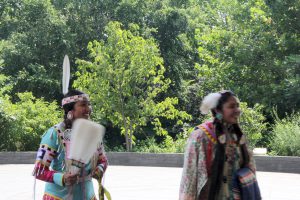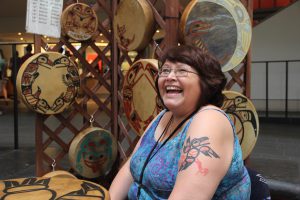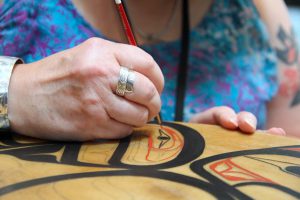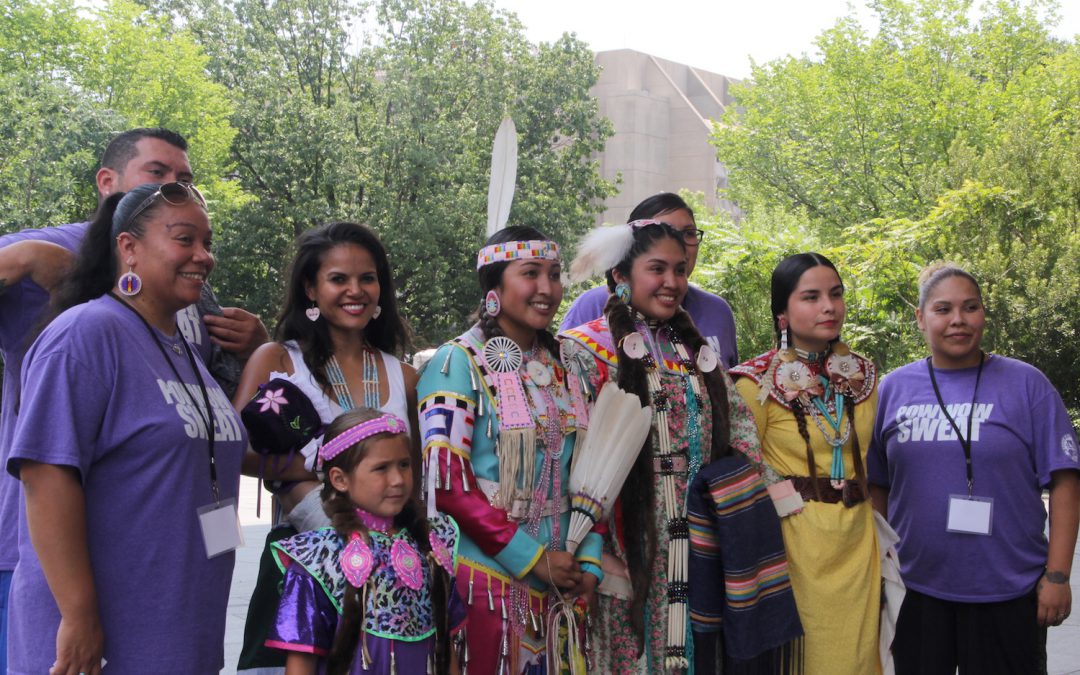WASHINGTON, D.C. – Imani Antone, a member of the Coeur d’Alene Tribe, has been dancing for as long as she can remember.
“No matter how stressed I may feel, dancing is the only time that I feel comforted or at peace,” she said.
Dressed in a traditional “jingle dress,” a multicolored outfit covered with silver ornaments that clink when she moves, Antone and other members of the tribe’s Powwow Sweat dance group visited the nation’s capital last week to teach visitors to the National Museum of the American Indian how to perform tribal dances and – more important – the cultural significance of those dances to the Coeur d’Alene Tribe. The event was part of the eighth-annual Living Earth Festival.
The three-day festival brings together Native American artists from across the country, featuring dancers, artisans and chefs cooking traditional cuisine. The Coeur d’Alene Tribe is one of 567 federally recognized tribes in the U.S, according to the National Congress of American Indians. Their Powwow Sweat dancers kicked off the festival with a 45-minute class that taught visitors the basics of their dance exercise routine.
“Powwow Sweat is a really fun way to exercise,” said dancer Nikki Pitre. “It’s fusing together our traditional and social dances with some cardio and a structured way to really get your heart rate going.”
Created by Lovina Louie, who runs the tribe’s wellness programs, Powwow Sweat aims to get tribal members excited about exercise, while also practicing traditional dances. It was developed under a $1.9 million grant from the Centers for Disease Control and Prevention to reduce obesity and other chronic diseases in the Coeur d’Alene Tribe.
In addition to offering Powwow Sweat classes at the tribe’s wellness center, there are a series of YouTube videos that teach the routines.

Imani Antone and fellow PowWow Sweat dancer relax after dancing. (Ritu Prasad/MEDILL)
“Please, do try this at home,” Pitre urged the festival’s attendees, many of them sweating after just 10 minutes of dancing.
“There’s a spiritual connection that you have when you’re on the dance floor that’s unlike any other feeling,” said Pitre. “I think it’s important for native people to maintain our culture, and we do so by dancing.”
The Powwow Sweat dancers tauhght classes twice a day throughout the weekend as part of the Living Earth Festival.
Painting traditions
To the side of the stage where the Powwow Sweat dancers performed, Edmonds, Washington, resident and Tlingit Tribe member Margie Morris showcased her work painting handmade elk skin drums.

Margie Morris, a Tlingit, shows her handmade elk-skin drums and raven tattoo: symbols of her tribe. (Ritu Prasad/MEDILL)
“For me, it’s showing that we’re still here,” said Morris as she painted a raven, the crest of her clan, on a drum. “The drumbeat is like the heartbeat, that we’re still going, and still able to sing our songs even though so many of our elders were punished for speaking their language.”
Morris first draws her design with pencil before painting it in with acrylic.

Margie Morris hand-paints each of her elk-skin drums and as a drummer herself, she fashions each piece keeping sound, art, and utility in mind. (Ritu Prasad/MEDILL)
She has been making – and playing – drums for over 30 years, and demonstrated her craft through Sunday at the museum.
Story by Katie Watkins. Video and photographs by Ritu Prasad.


